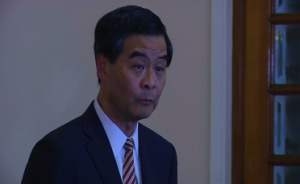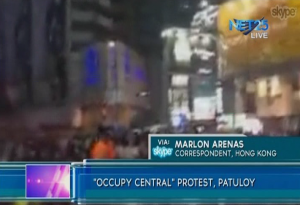
BY CLARE BALDWIN AND JOHN RUWITCH
(Reuters) – Hong Kong leader Leung Chun-ying defied pro-democracy protesters’ demands to step down by Friday, and repeated police warnings that the consequences would be serious if they sought to surround or occupy government buildings.
Leung, speaking to reporters just minutes before an ultimatum for him to resign expired, also said that Chief Secretary Carrie Lam would hold a meeting with students soon to discuss political reforms. He gave no time frame.
Some of the thousands of people massed outside Leung’s office voiced disappointment, although the atmosphere was calm.
“The request is very simple. We want real democracy. When you ask for an apple you should get an apple. You don’t get an orange made to look like an apple,” said Howard Hu, a 35-year-old engineer.
Others suspected that Hong Kong authorities were trying to buy time and wait for demonstrations to dwindle.
“The government says it wants to talk to us but we can predict the outcome,” said Isaac Chan, a private music tutor, as he sat on the road wearing a paper face mask.
“The government already has an answer in its heart. They will not let us have real universal suffrage. We think this is a tactic being used to cool the crowd because (Friday) is a work day, not a holiday,” added the 22-year-old.
As he spoke, the crowd around him began thinning out, and only about 1,000 people remained by 3 a.m. Several thousand more were still in the streets in other parts of the city.
Student groups welcomed the offer of talks, but they urged followers to stay where they were to keep up the pressure on the government. The “Occupy Central with Love and Peace” movement reiterated its demand that Leung step aside.
Tens of thousands have taken to the streets in the last week to demand full democracy, including a free voting system when they come to choose a new leader in 2017.
China decreed on Aug. 31 that it would vet candidates wishing to run for the post of Hong Kong’s chief executive, and residents have aimed their anger at Leung, who enjoys Beijing’s support.
A front-page editorial on Thursday in the People’s Daily, the Communist Party mouthpiece, lauded Leung’s leadership and the police response to the protests.
“The central government fully trusts Chief Executive Leung Chun-ying and is very satisfied with his work,” it said.
“SERIOUS” CONSEQUENCES
The protests, the worst to hit Hong Kong since China resumed its rule of the former British colony in 1997, have brought parts of the Asian trading hub to a standstill.
Last weekend police used teargas, pepper spray and batons to quell the unrest, but since then the clashes have subsided as both sides appeared ready to dig in for a protracted stand-off.
Student leaders had demanded that Leung resign by midnight on Thursday, and called on their followers to occupy government buildings if he refused.
“I won’t resign because I must carry out the universal suffrage work,” Leung told a brief news conference, referring to electoral reforms. His decision had been widely anticipated.
“In any place in the world, if there are any protesters that surround, attack, or occupy government buildings like police headquarters or the chief executive’s office … the consequences are serious,” he said, reflecting warnings from the police that their response to any such action would be robust.
The “Occupy Central” movement presents one of the biggest political challenges for Beijing since it violently crushed pro-democracy protests in Tiananmen Square in 1989.
Universal suffrage is an eventual goal under the “one country, two systems” formula by which China rules Hong Kong. Under that formula, China accords Hong Kong some autonomy and freedoms not enjoyed on the mainland.
China has dismissed the protests as “illegal”, but cracking down too hard could shake confidence in market-driven Hong Kong, which has a separate legal system from the rest of the country.
Not reacting firmly enough could embolden dissidents in mainland China.
A top Chinese envoy has warned that the unrest could tarnish the city’s reputation as one of the world’s leading financial centers if they continued for a prolonged period.
China’s ambassador to Germany, Shi Mingde, told Reuters that the city’s reputation as a financial hub was not under threat for now. “But if shares fall, if the unrest continues, then the social order and (Hong Kong’s) role as a financial center will be in danger,” he said in an interview in Berlin.
The markets were closed on Thursday for a holiday, but Hong Kong’s benchmark share index, the Hang Seng Index, plunged 7.3 percent in September. Spooked by the protests, some banks and other financial firms have begun moving staff to back-up premises on the outskirts of the city.
ENDGAME UNCERTAIN
Now that Leung has refused to meet the demands of protesters, they are pondering their next step.
Student leaders have vowed to keep up their campaign, but the government’s patience could eventually run out, or alternatively demonstrations could lose momentum.
“It seems that the protesters are now divided into two parts: those that want to occupy the (streets) and those that don’t,” said Edwin Leung, a 19-year-old studying social sciences. “The movement has no leader.”
Fashion designer Crystal Chung said the demonstrations had achieved something at least.
“They (the authorities) avoided us for so many days, but offered to talk after we came and surrounded the government building,” she said.
But the 25-year-old shared the concerns of many around her.
“Will we get real universal suffrage? We are facing the Chinese government which is very powerful, and I really doubt that they will listen to our demands. But as Hong Kong citizens, we are here to do what we can.”








